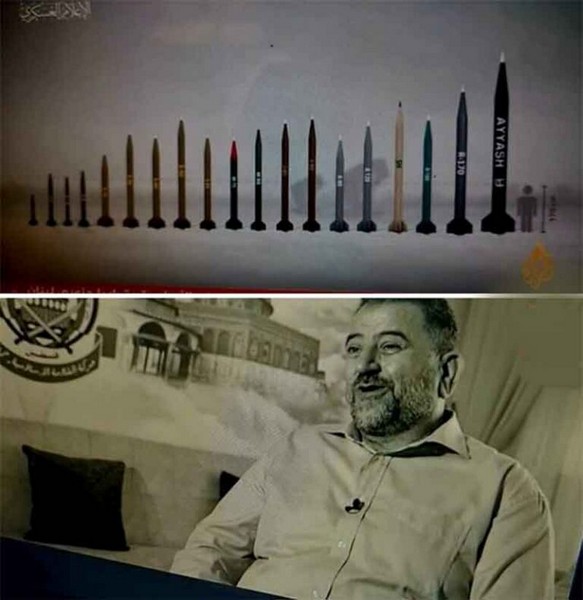By Rima Najjar
It is beyond me how Israel has failed to figure out that a martyred Palestinian leader exerts a vastly more powerful hold on his people’s imagination and will to resist than a living one.
After decades of targeting and killing a long list of Palestinian leaders (or imprisoning them), Israel has not learned that another generation of leaders, stronger and fiercer than their predecessor, emerges inevitably. It makes me wonder if Israel is merely stupid or insane. There is a saying that goes, “Insanity is doing the same thing over and over again and expecting different results.”
To people following Israel’s war on Gaza and unaware of Israel’s policy of targeted killing, the assassination in Lebanon of Saleh al-Arouri, Deputy Chair of the Political Bureau of Hamas and founder of the Martyr Ezzedine al-Qassam Brigades, may have come as a surprise. My own reaction included an element of surprise but for a different reason. I had been betting incorrectly that Israel and the US were smarter than to risk a war with Hezbollah.
Some Israeli ministers who had not received Netanyahu’s memo to keep their mouths shut about the killings foolishly tweeted congratulations to Mossad and Shin Bet on the deed, thus proving that they are not motivated by deterrence, but rather by revenge and hubris.
Not that targeted killing of Palestinian leaders has ever been effective as a deterrence measure. A few days before the assassination of al-Arouri and several of his comrades (collateral damage?), I had watched a presentation on al-Jazeera Arabic showcasing the various families of home-made rockets in the possession of the Palestinian armed resistance. Each slide showed a group of rockets with the picture next to it of an assassinated leader after whom the class of rockets was named.
Image: Ayyash Rocket, named after martyred engineer Yahya Ayyash; Ranteesi Rocket, named after martyred leader Abdel Azziz al-Ranteesi; Abu Shammaleh Rocket, named after martyred leader Mohammad Abu Shammaleh; Attar Rocket, named after martyred leader Raed al-Attar; Ja’abari Rocket, named after martyred leader Ahmad al-Ja’abari; Rocket M90, named after martyred leader Ibrahim al-Maqadmeh
I am certain soon we can look forward to a family of al-Qassam Brigades’ rockets named after martyred leader Saleh al-Arouri.
Image: Al-Qassam Rocket, named after Sheikh Izzedine al-Qassam
Israel has used extrajudicial executions (aka targeted killing) of Palestinian leaders openly since 2001, giving itself a license to kill, including in the territories of other States. By re-characterizing individuals as “terrorists” (al-Arouri was also on the US terrorism list with a bounty of $5m (£4m) on his head since 2018), Israel and the US justify such killing within the framework of the law of armed conflict, thus blurring and expanding that law (also known as international humanitarian law) and making the global order less safe for everybody. Read “10 things the rules of war do” published by the International Committee of the Red Cross, and you will immediately notice that the US and Israel are violating every single rule in Gaza.
In an article titled, ‘Operation Al-Aqsa Flood’ Day 76: Extrajudicial Killings of Men in Front of Their Families in Gaza, we learn that “Israeli forces have reportedly conducted extrajudicial executions in front of families in Gaza as international leaders continue to discuss Israel’s conduct with little to no action, while negotiations between Israel and Hamas waver as war rages on.”
Extrajudicial executions are illegal under international law and are considered a fundamental violation of human rights and an “affront to the conscience of humanity.” In the same way that Israel argues falsely (most recently as it defends itself against genocide accusation at ICJ) that its policy of genocide and ethnic cleansing in Gaza or the West Bank is consistent with international law, “because Israel is engaged in armed conflict with terrorists,” it lies about the people it targets by saying they are “usually killed by conventional military means, not through deception, and the targets of the attacks are not civilians but combatants or are part of a military chain of command.”
The following statistics give an idea of how this policy works in bolstering Israel’s repressive measures against Palestinians: “… from the beginning of the second intifada, on 29 September 2000, to the end of 2010, Israeli security forces killed 4,927 Palestinians in the West Bank and in the Gaza Strip, 970 of them minors (under age 18). At least 2,227 of the fatalities were not taking part in hostilities. Another 239 were the object of a targeted killing. Thousands more were injured. [These figures do not include the casualties in Operation Cast Lead.]”
Palestinians have yet to be deterred by Israel’s policies and the cover of impunity the US gives them. Predictably, the reaction is quite the opposite as is evident in the following press statement issued by the joint leadership of the People’s Democratic Party and the Arab Socialist Labor Party in Lebanon on Jan 3, following the assassination of al-Arouri and his comrades. The two parties offered their condolences and affirmed “The natural response to the crime will be to escalate the resistance in Gaza, the West Bank and all supporting fronts, and the enemy entity will be under the fire of resistance from southern Lebanon, Iraq, Yemen and Syria.”
Rima Najjar is a Palestinian whose father’s side of the family comes from the forcibly depopulated village of Lifta on the western outskirts of Jerusalem and whose mother’s side of the family is from Ijzim, south of Haifa.
5 January 2024
Source: countercurrents.org

